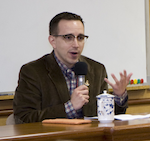[This post has been updated as of 9:00 a.m. PST on 5.4.09. Thanks to Andrew Merz for the correction.]
I haven’t posted to Ye Olde Elephant Journal in a while because I recently moved across the country to begin my new job as Coordinator of the Buddhist Chaplaincy Program at University of the West in Rosemead, CA. (UWest is an institutional our fearless leader Waylon Lewis blogged about not long ago in this post.)
The recent accreditation of UWest’s Master of Divinity (M.Div.) in Buddhist Chaplaincy is significant when one considers the limited educational resources for Buddhists with a view to a career in professional chaplaincy.
Professional chaplains are generally certified by whatever organization serves and supports spiritual care work in their particular area. (Healthcare and hospice chaplains are certified by the Association for Professional Chaplains, police chaplains by the International Conference of Police Chaplains, military chaplains by the National Conference on Ministry to the Armed Forces, and so on.) All of these organizations have their own standards and competencies. For all intents and purposes, we could think of board certification with the A.P.C. as the “gold standard” for professional chaplains. They require:
- a B.A. plus a theological education at the graduate professional level, which involves a minimum of 72 semester hours or 108 quarter hours of credit taken at an accredited school
- 4 units of Clinical Pastoral Education (C.P.E.)
- documentation of one year (2,000 hours) full time chaplaincy experience completed after the candidate’s C.P.E. residency
- ordination or commissioning to function in a ministry of pastoral care
- ecclesiastical endorsement
In terms of number one, there exist four institutions offering graduate-level training programs for Buddhists with a view to a career in professional chaplaincy: Naropa University, the Institute of Buddhist Studies, University of the West (there’s still time to apply–applications are due July 1st!), and Harvard Divinity School. Our friend Andrew Merz notes that in the HDS’s MDiv program, students can “focus on any faith tradition studied at the school, and there is a nice little community of Buddhist MDivs developing, with a curriculum specific to their needs.” (In particular, the Buddhist Arts of Ministry courses have been designed to serve these students.)
As far as C.P.E. training units are concerned, there are a few that offer special sensitivity to Buddhist practitioners: The New York Zen Center for Contemplative Care has recently been given “the green light to offer the first fully-accredited professional Buddhist ACPE CPE program in the United States”; Naropa University and the Samaritan Counseling & Education Center of the Pikes Peak Region in Colorado Springs, CO, have developed a C.P.E. training with a special emphasis on contemplative practice; Ven. Thom Kilts is a supervisor at the John Muir Medical Center‘s Concord, MA, campus; Bryan Ferry, who is ordained through Thich Nhat Hanh’s Order of Interbeing, is an A.C.P.E. supervisory candidate in the Spiritual Care Department at Children’s Hospital Los Angeles; and Julie Harada Lee serves as a supervisor at Harborview Medical Center in Seattle, WA. It’s also worth mentioning that before taking on the job as A.C.P.E. Supervisor for the New York Zen Center for Contemplative Care’s program, Rev. Trudi J. Hirsch, a Zen priest, was an A.C.P.E. supervisor at The Healthcare Chaplaincy in New York City.
In terms of ordination or commissioning to function in a ministry of pastoral care, it seems that (at the moment) only the Upaya Buddhist Chaplaincy Training is designed to end with participants being ordained–in this case, as either “lay chaplains” or “Zen Buddhist chaplain priests.”
For those interested in investigating chaplaincy or developing some skills necessary to be a volunteer, there is the non-professional Sati Center Training in Buddhist Chaplaincy. The program states clearly that it will not qualify participants for full-time jobs as chaplains, but that their trainings “can serve as preparation and discernment for people considering a career in professional chaplaincy.”
You can take a look at the new and improved page for UWest’s M.Div. program right here. Among other things, you will find:
There are more changes and updates yet to come, but this information ought to answer some initial questions for prospective students out there. Take a look, and let us know what you think.
You can also find out what those of us participating in UWest’s Buddhist Chaplaincy Program are doing at our official blog. In addition, you can follow us on Twitter, Facebook, and the Tricycle Community. These are some other great ways to stay current with us, and we’d also just appreciate connecting with you.






Read 5 comments and reply